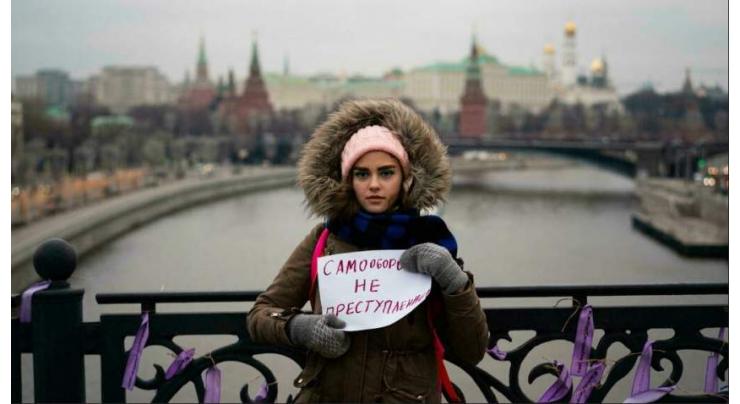
- Home
- World
- News
- Russian Law on Domestic Violence May Change After ECHR Ruling on Gracheva Case - Moscow
Russian Law On Domestic Violence May Change After ECHR Ruling On Gracheva Case - Moscow
Faizan Hashmi Published December 23, 2021 | 01:10 PM

Russian legislation on domestic violence may change, Commissioner for Human Rights at the Russian Foreign Ministry Grigory Lukyantsev told Sputnik shortly after the European Court of Human Rights (ECHR) obliged the country to pay 370,000 euros ($419,000) to Margarita Gracheva, whose ex-husband cut off her hands
MOSCOW (UrduPoint News / Sputnik - 23rd December, 2021) Russian legislation on domestic violence may change, Commissioner for Human Rights at the Russian Foreign Ministry Grigory Lukyantsev told Sputnik shortly after the European Court of Human Rights (ECHR) obliged the country to pay 370,000 Euros ($419,000) to Margarita Gracheva, whose ex-husband cut off her hands.
Earlier in December, the ECHR ordered Russia to pay Gracheva 370,000 euros, partly in moral damages and partly as compensation for medical services and loss of income. Kremlin spokesman Dmitry Peskov declined to comment on the decision of the ECHR, saying only that Russia has enough tools to combat domestic violence.
"It is quite possible (that law may be changed) because some legislative initiatives and bills regarding the issue are being considered. It is difficult to predict, since the issue is very sensitive and difficult, there are many different positions, including those related to historical, religious approaches. The question is how to reconcile them and reflect this in the provisions of our legislation," the diplomat said.
Lukyantsev remarked that Russia implemented about 95% of the court's decisions, even though it did not always see eye to eye with the ECHR.
"We have some well-known contradictions and issues with the ECHR, but, actually, if you look at the statistics in general, we implement more than 90% of the ECHR decisions, about 95% even. We pay compensations, take steps to change laws and practices," the diplomat said.
The court and Russia disagree on some high-profile cases because some of the court's rulings contradict the Russian constitution, Lukyantsev said.
In the case of Margarita Gracheva, the ECHR found that the Russian authorities had failed to take appropriate measures to protect the woman. The court said that the intervention of Russian law enforcement officers was untimely, and the behavior of the police itself was passive due to the alleged structural bias. During the proceedings in that and similar cases, the Russian side argued that the incidents had nothing to do with the performance of the government agencies.
Margarita lost her hand in November 2017, when her then-husband, Dmitry Grachev, took her to a forest not far from Moscow, took away her mobile phone and cut off both her hands with an ax. Doctors were able to save her left hand and fitted her with a prosthetic for the right one. In 2019, a Russian court sentenced the man to 14 years in a strict regime colony and ordered him to pay the victim compensation in the amount of 2.35 million rubles. The prosecutor's office insisted on 17 years of imprisonment for the accused, while Margarita Gracheva demanded compensation of 8.2 million rubles.�Margarita did not agree with the court's decision.
Margarita, who has two children with Dmitry, has since married again and given birth to a third child.
Related Topics
Recent Stories

Pakistan , Ireland to lock horns in first T20I match tomorrow

Wings of Faith: 2160 Pakistani Hujjaj reach the Prophet's city to embark on spir ..

PTI founder Imran Khan globally famous leader: Alvi

Perpetrators of May 9 incidents to be brought to justice: PM

Samina Rahmat Manal's poetry collection "Mohabbat Fatih-e-Alam" launched

CM Bugti for more funds for minorities, women, marginalized communities

No one will be allowed to disrespect Shuhada: COAS

May 9, catastrophic incidents were conspiracy to disrupt country’s development ..

Chairman Senate condemns May 9 incident

Uzbekistan's Foreign Minister meets Bilawal Bhutto

Punjab CM Maryam visits Jinnah House in connection with May 9

NA speaker strongly condemns killing of 7 innocent workers in Gwadar
More Stories From World
-

Wings of Faith: 2160 Pakistani Hujjaj reach the Prophet's city to embark on spiritual journey
26 minutes ago -

Spanish court shelves Shakira tax fraud case
58 minutes ago -

CPEC helps Pakistan expand economic base, enhance regional connectivity over past decade: Ahsan Iqba ..
58 minutes ago -

Scientists win World Food Prize for work on Global Seed Vault
58 minutes ago -

Boeing passenger plane exits runway in Senegal injuring 11
3 hours ago -

Pakistan eyes green energy, technology cooperation with China in CPEC 2nd phase
3 hours ago
-

Charities warns Italy's ban on NGO planes risks lives
3 hours ago -

Israel hits Rafah despite US warning on arms transfers
3 hours ago -

Boeing plane leaves runway in Senegal injuring 11
3 hours ago -

Israel says Biden threat to stop arms 'very disappointing'
3 hours ago -
Marquez eyes French MotoGP victory but plays down title talk
5 hours ago -
Football: French Ligue 1 table
5 hours ago









